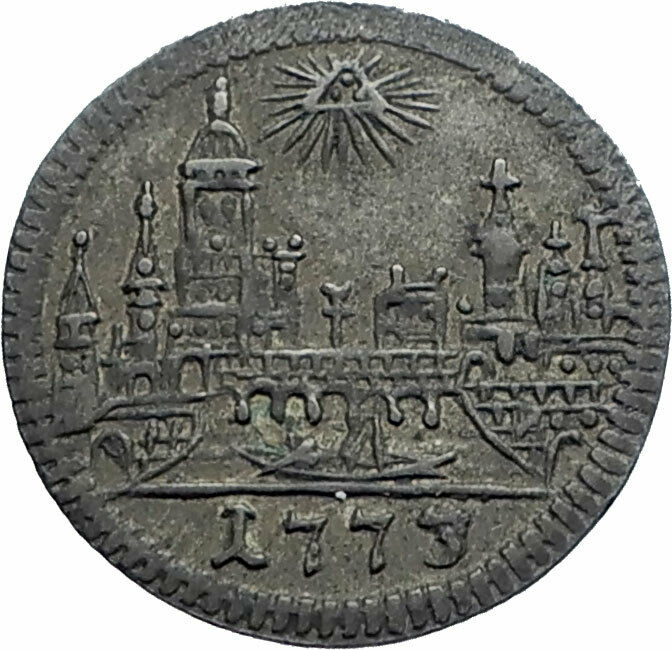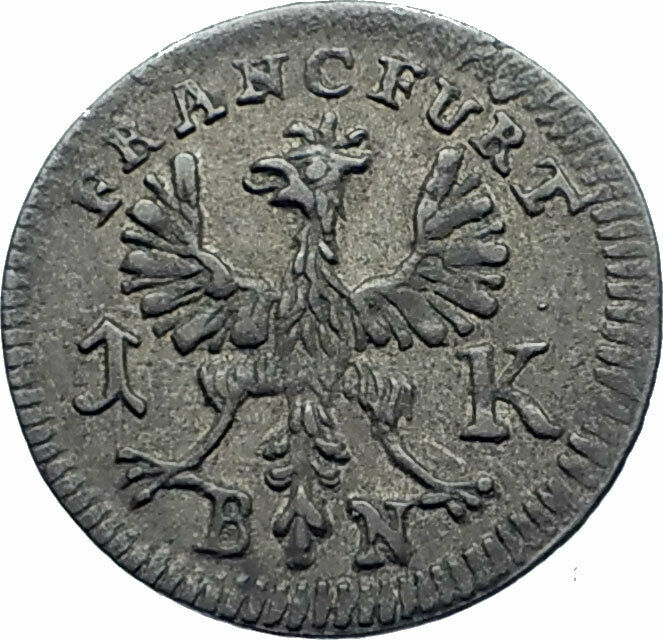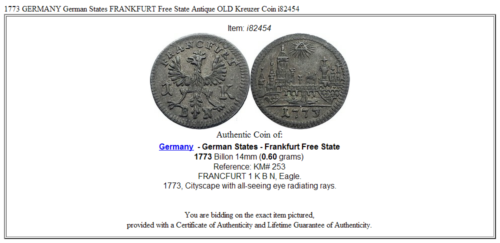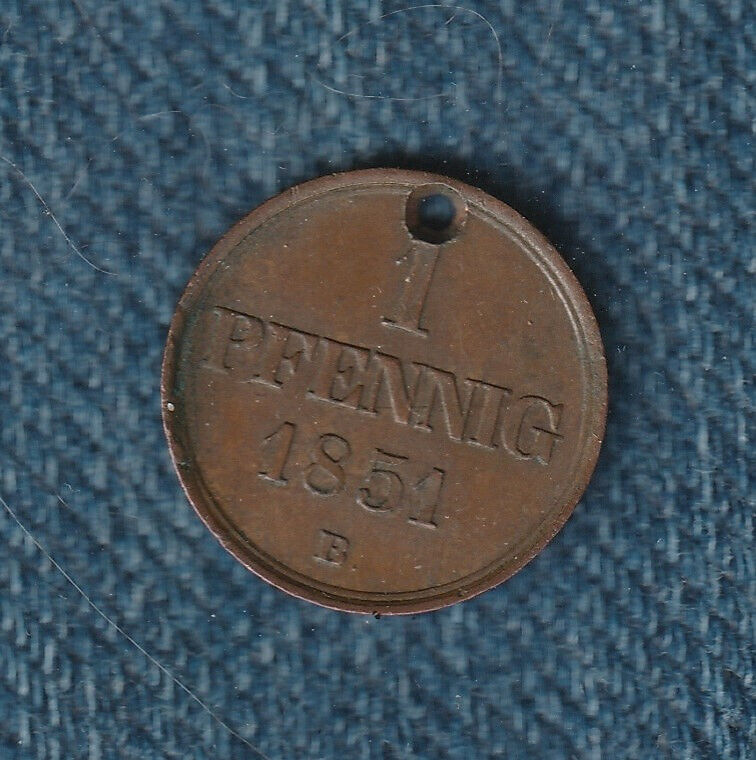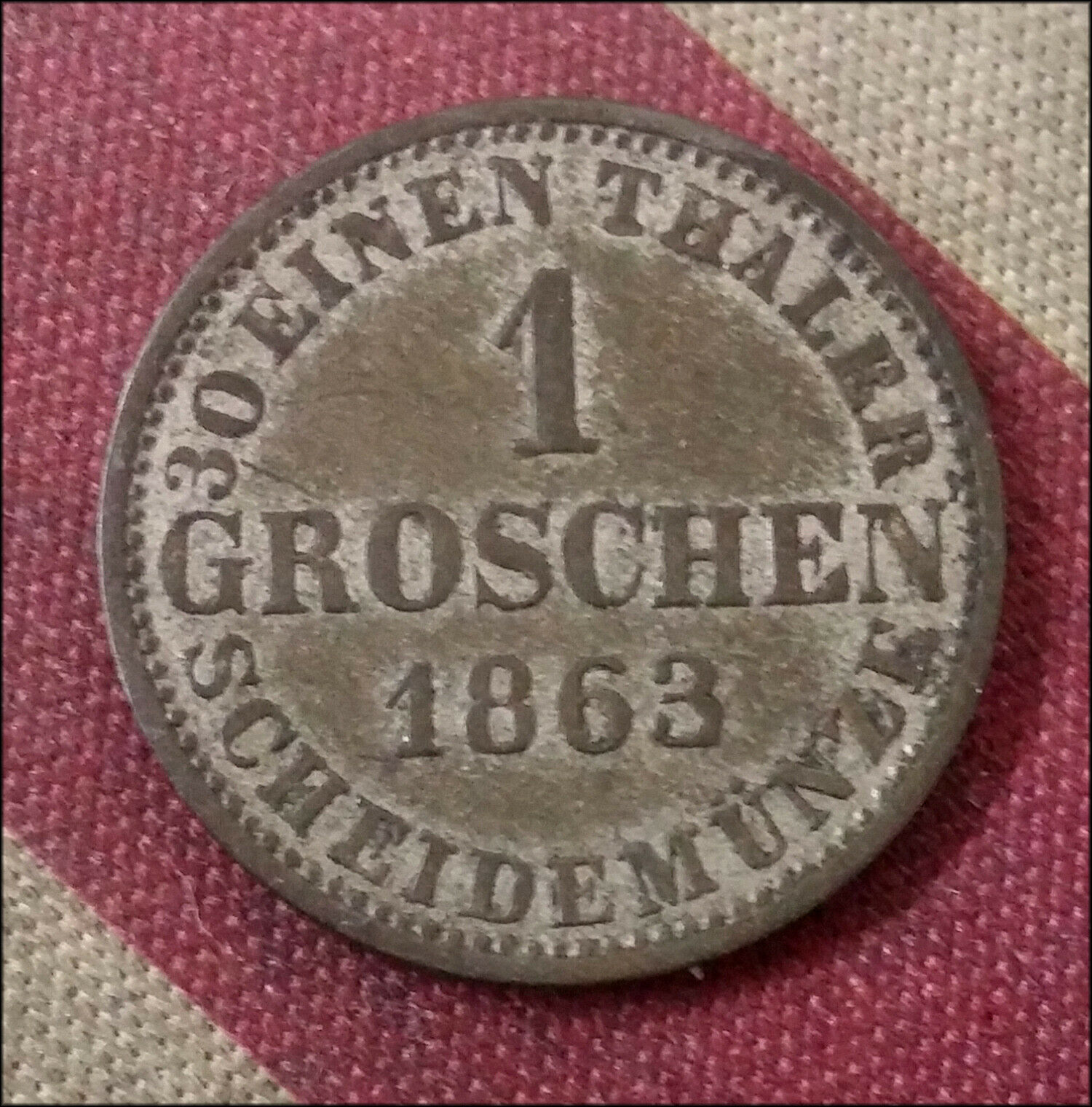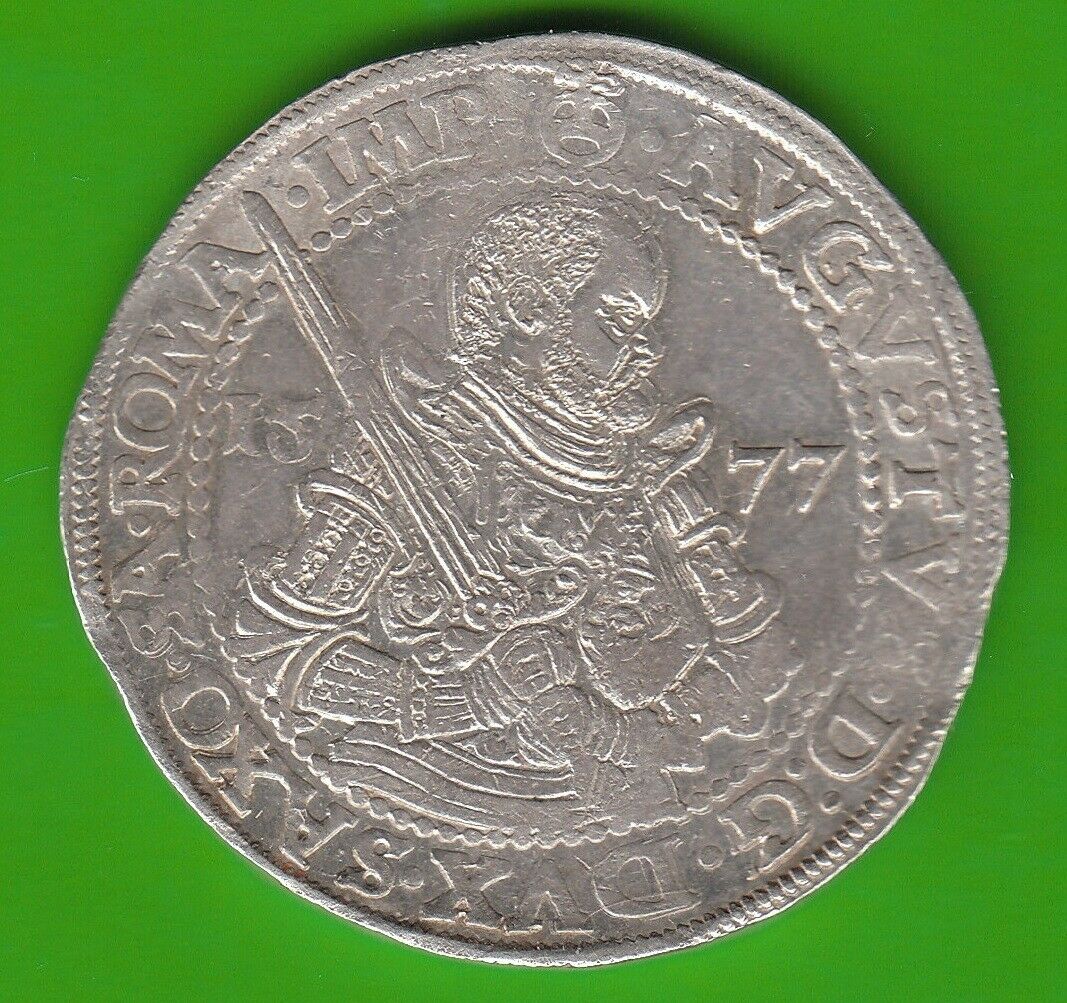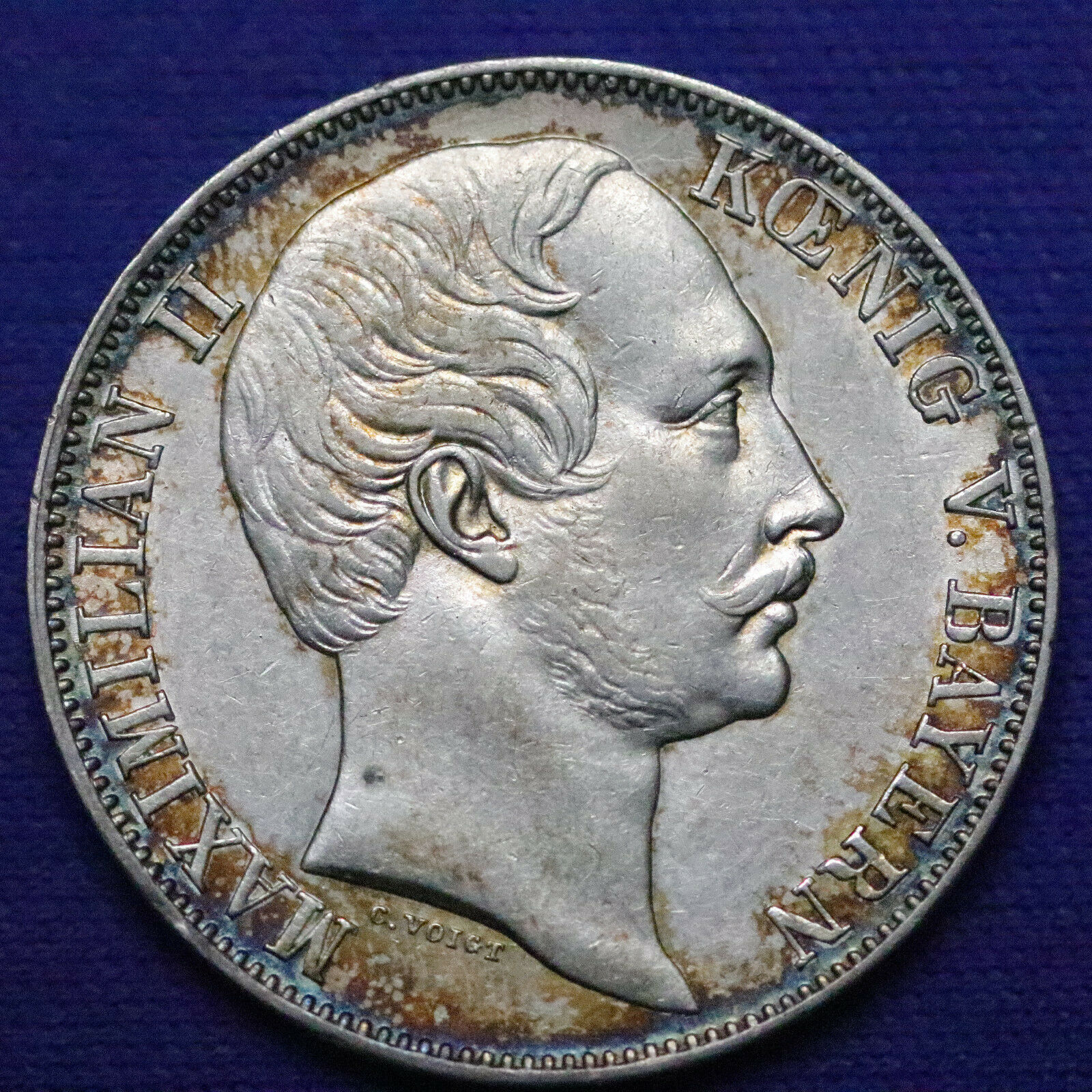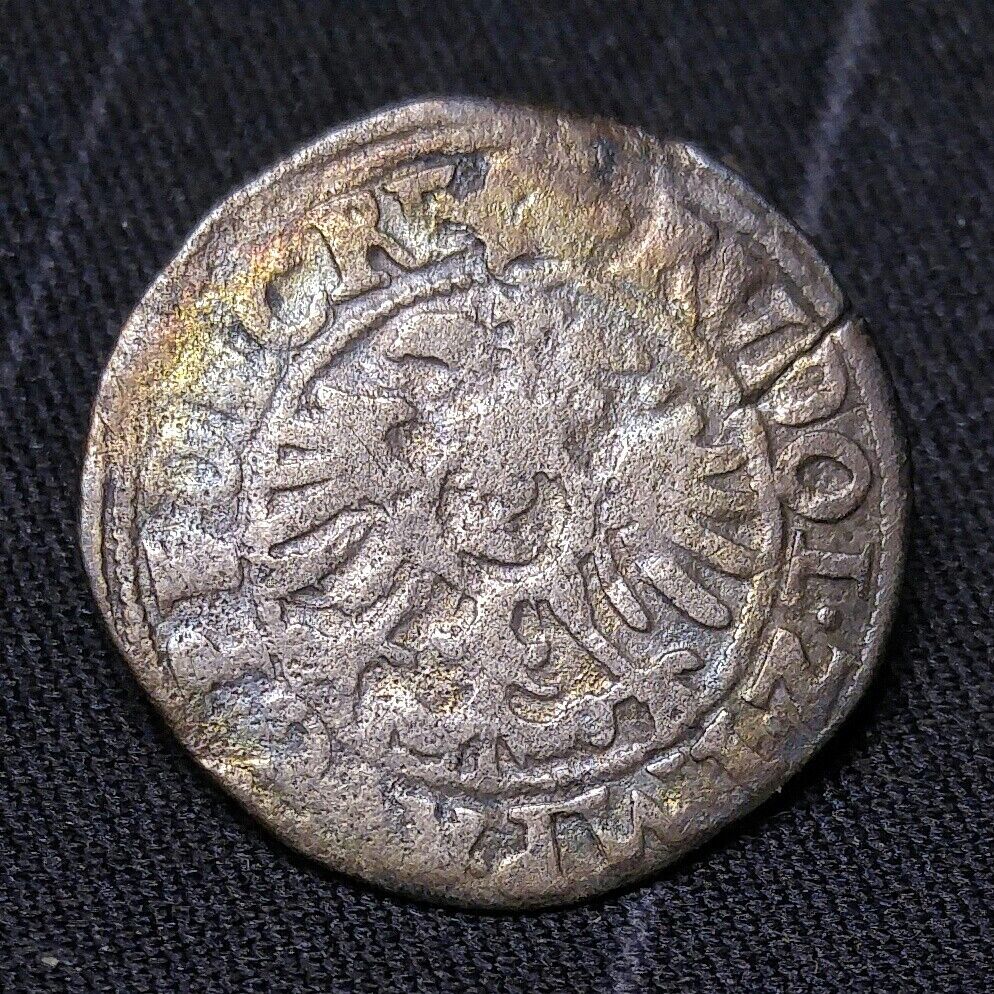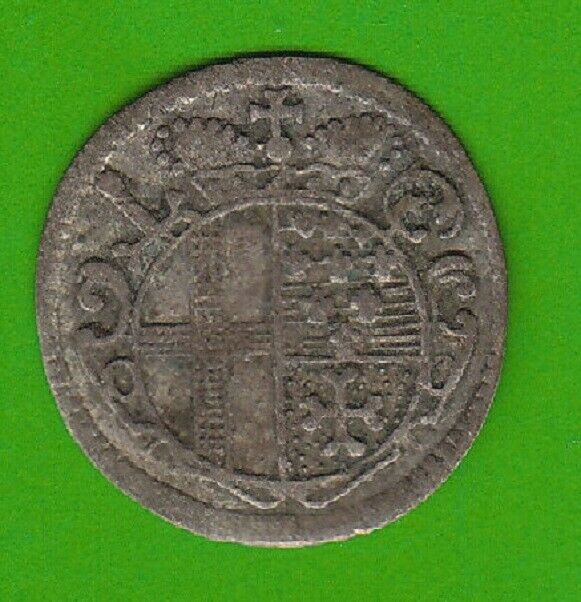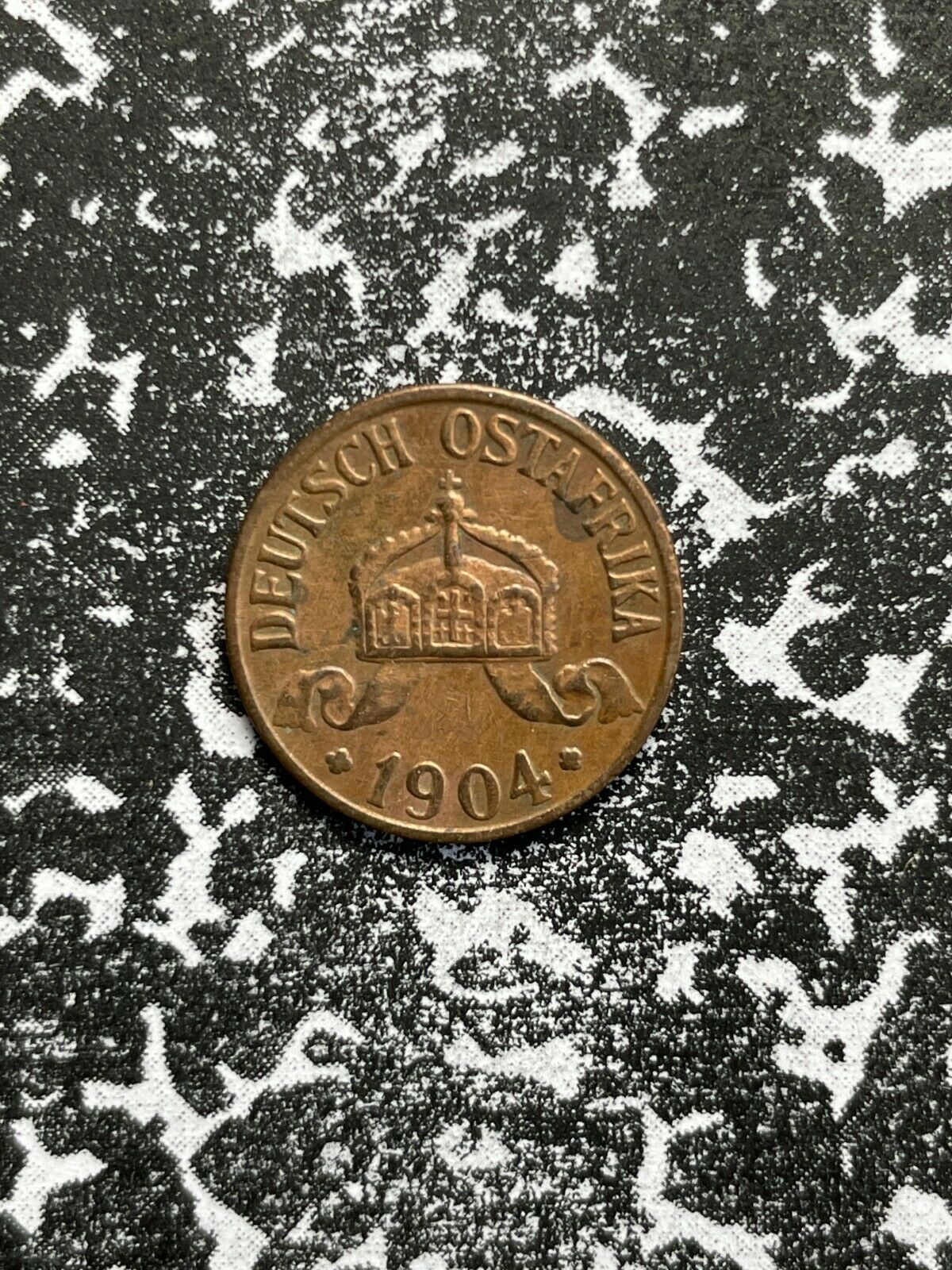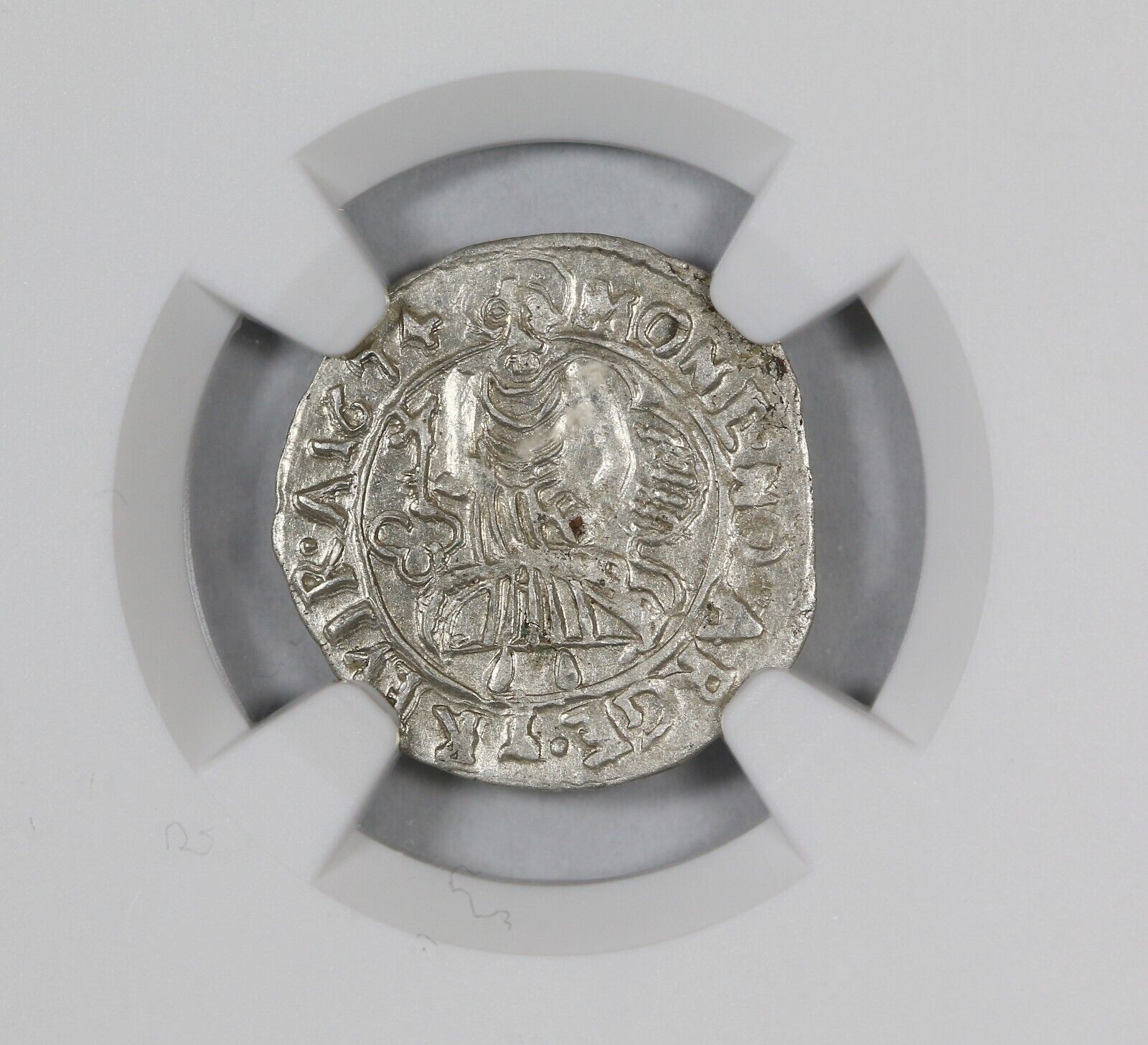-40%
1773 GERMANY German States FRANKFURT Free State Antique OLD Kreuzer Coin i82454
$ 165.6
- Description
- Size Guide
Description
Item:i82454
Authentic Coin of:
Germany
- German States - Frankfurt Free State
1773
Billon Silver Kreuzer 14mm (
0.60
grams)
Reference: KM# 253
FRANCFURT 1 K B N, Eagle.
1773, Cityscape with all-seeing eye radiating rays.
You are bidding on the exact item pictured, provided with a Certificate of Authenticity and Lifetime Guarantee of Authenticity.
Billon
is an alloy of a precious metal (most commonly silver) with a majority base metal content (such as copper). It is used chiefly for making coins, medals, and token coins. The word comes from the French
bille
. The use of billon coins dates from ancient Greece through the Middle Ages. During the 6th and 5th centuries BC, some cities on Lesbos Island used coins made of 60% copper and 40% silver. Billon coins are perhaps best known from the Roman Empire, where progressive debasements of the Roman denarius and the Roman provincial tetradrachm.
Frankfurt
(officially:
Frankfurt am Main
lit. "Frank ford at the Main")) is a metropolis and the largest city of the German federal state of Hesse, and its 746,878 (2017) inhabitants make it the fifth-largest city of Germany after Berlin, Hamburg, Munich, and Cologne. On the River Main (a tributary of the Rhine), it forms a continuous conurbation with the neighbouring city of Offenbach am Main, and its urban area has a population of 2.3 million. The city is at the centre of the larger Rhine-Main Metropolitan Region, which has a population of 5.5 million and is Germany's second-largest metropolitan region after the Rhine-Ruhr Region. Since the enlargement of the European Union in 2013, the geographic centre of the EU is about 40 km (25 mi) to the east of Frankfurt's central business district. Like France and Franconia, the city is named after the Franks. Frankfurt is the largest city in the Rhine Franconian dialect area (Franconian, Central German dialects).
Frankfurt was a city state, the Free City of Frankfurt, for nearly five centuries, and was one of the most important cities of the Holy Roman Empire, as a site of imperial coronations; it lost its sovereignty upon the collapse of the empire in 1806 and then permanently in 1866, when it was annexed by the Kingdom of Prussia. It has been part of the federal state of Hesse since 1945. The city is culturally and ethnically diverse, with around half of the population, and a majority of young people, having a migration background. A quarter of the population are foreign nationals, including many expatriates.
Frankfurt is an alpha world city and a global hub for commerce, culture, education, tourism and transportation. It is the site of many global and European corporate headquarters. Frankfurt Airport is among the world's busiest. Frankfurt is the major financial centre of the European continent, with the headquarters of the European Central Bank, German Federal Bank, Frankfurt Stock Exchange, Deutsche Bank, DZ Bank, KfW, Commerzbank, several cloud and fintech startups and other institutes. Automotive, technology and research, services, consulting, media and creative industries complement the economic base. Frankfurt's DE-CIX is the world's largest internet exchange point. Messe Frankfurt is one of the world's largest trade fairs. Major fairs include the Frankfurt Motor Show, the world's largest motor show, the Music Fair, and the Frankfurt Book Fair, the world's largest book fair.
Frankfurt is home to influential educational institutions, including the Goethe University, the UAS, the FUMPA, and graduate schools like the Frankfurt School of Finance & Management. Its renowned cultural venues include the concert hall Alte Oper, Europe's largest English theatre and many museums (e.g. the Museumsufer ensemble with Städel and Liebieghaus, Senckenberg Natural Museum, Goethe House, and the Schirn art venue at the old town). Frankfurt's skyline is shaped by some of Europe's tallest skyscrapers. The city is also characterised by various green areas and parks, including the central Wallanlagen, the City Forest and two major botanical gardens, the Palmengarten and the University's Botanical Garden. In electronic music, Frankfurt has been a pioneering city since the 1980s, with renowned DJs including Sven Väth, Marc Trauner, Scot Project, Kai Tracid, and the clubs Dorian Gray, U60311, Omen and Cocoon. In sports, the city is known as the home of the top tier football club Eintracht Frankfurt, the Löwen Frankfurt ice hockey team, the basketball club Frankfurt Skyliners, the Frankfurt Marathon and the venue of Ironman Germany.
Early history and Holy Roman Empire
Roman settlements were established in the area of the
Römer
, probably in the first century.
Nida
(Heddernheim) was also a Roman civitas capital.
Alemanni and Franks lived there, and by 794, Charlemagne presided over an imperial assembly and church synod, at which
Franconofurd
(alternative spellings end with -furt and -vurd) was first mentioned.
Frankfurt was one of the most important cities in the Holy Roman Empire. From 855, the German kings and emperors were elected and crowned in Aachen. From 1562, the kings and emperors were crowned in Frankfurt, initiated for Maximilian II. This tradition ended in 1792, when Franz II was elected. His coronation was deliberately held on Bastille Day, 14 July, the anniversary of the storming of the Bastille. The elections and coronations took place in St. Bartholomäus Cathedral, known as the
Kaiserdom
(Emperor's Cathedral), or its predecessors.
The
Frankfurter Messe
(Frankfurt Trade Fair) was first mentioned in 1150. In 1240, Emperor Friedrich II granted an imperial privilege to its visitors, meaning they would be protected by the empire. The fair became particularly important when similar fairs in French Beaucaire lost attraction around 1380. Book trade fairs began in 1478.
In 1372, Frankfurt became a
Reichsstadt
(Imperial Free City), i.e., directly subordinate to the Holy Roman Emperor and not to a regional ruler or a local nobleman.
In 1585, Frankfurt traders established a system of exchange rates for the various currencies that were circulating to prevent cheating and extortion. Therein lay the early roots for the Frankfurt Stock Exchange.
Frankfurt managed to remain neutral during the Thirty Years' War, but suffered from the bubonic plague that refugees brought to the city. After the war, Frankfurt regained its wealth.
Impact of French revolution and the Napoleonic Wars
Following the French Revolution, Frankfurt was occupied or bombarded several times by French troops. It remained a free city until the collapse of the Holy Roman Empire in 1805/6. In 1806, it became part of the principality of Aschaffenburg under the
Fürstprimas
(Prince-Primate), Karl Theodor Anton Maria von Dalberg. This meant that Frankfurt was incorporated into the confederation of the Rhine. In 1810, Dalberg adopted the title of a Grand Duke of Frankfurt. Napoleon intended to make his adopted son Eugène de Beauharnais, already
Prince de Venise
("prince of Venice", a newly established primogeniture in Italy), Grand Duke of Frankfurt after Dalberg's death (since the latter as a Catholic bishop had no legitimate heirs). The Grand Duchy remained a short episode lasting from 1810 to 1813, when the military tide turned in favour of the Anglo-Prussian lead allies that overturned the Napoleonic order. Dalberg abdicated in favour of Eugène de Beauharnais, which of course was only a symbolic action, as the latter effectively never ruled after the ruin of the French armies and Frankfurt's takeover by the allies.
Frankfurt as a fully sovereign state
After Napoleon's final defeat and abdication, the Congress of Vienna (1814-1815) dissolved the grand-duchy and Frankfurt became a fully sovereign city state with a republican form of government. Frankfurt entered the newly founded German Confederation (till 1866) as a free city, becoming the seat of its
Bundestag
, the confederal parliament where the nominally presiding Habsburg Emperor of Austria was represented by an Austrian "presidential envoy".
After the ill-fated revolution of 1848, Frankfurt was the seat of the first democratically elected German parliament, the Frankfurt Parliament, which met in the Frankfurter Paulskirche (St. Paul's Church) and was opened on 18 May 1848. The institution failed in 1849 when the Prussian king declared that he would not accept "a crown from the gutter". In the year of its existence, the assembly developed a common constitution for a unified Germany, with the Prussian king as its monarch.
Frankfurt after the loss of sovereignty
Frankfurt lost its independence after the Austro-Prussian War in 1866 when Prussia annexed several smaller states, among them the Free City of Frankfurt. Frankfurt had stayed neutral in the war,
[
citation needed
]
but its free press bothered the Prussians and they used the opportunity to occupy the city by force: Bismarck had been an ambassador to the German Confederation there and constantly quarrelled with the local press. The Prussian administration incorporated Frankfurt into its province of Hesse-Nassau. The Prussian occupation and annexation was perceived as a great injustice in Frankfurt, which retained its distinct western European, urban and cosmopolitan character. The formerly independent towns of Bornheim and Bockenheim were incorporated in 1890.
In 1914, the citizens founded the University of Frankfurt, later named Goethe University Frankfurt. This marked the only civic foundation of a university in Germany; today it is one of Germany's largest.
From 6 April to 17 May 1920, following military intervention to put down the Ruhr uprising, Frankfurt was occupied by French troops. The French claimed that Articles 42 to 44 of the peace treaty of Versailles concerning the demilitarisation of the Rhineland had been broken. In 1924, Ludwig Landmann became the first Jewish mayor of the city, and led a significant expansion during the following years. During the Nazi era, the synagogues of the city were destroyed.
Frankfurt was severely bombed in World War II (1939-1945). About 5,500 residents were killed during the raids, and the once-famous medieval city centre, by that time the largest in Germany, was almost completely destroyed. It became a ground battlefield on 26 March 1945, when the Allied advance into Germany was forced to take the city in contested urban combat that included a river assault. The 5th Infantry Division and the 6th Armored Division of the United States Army captured Frankfurt after several days of intense fighting, and it was declared largely secure on 29 March 1945.
After the end of the war, Frankfurt became a part of the newly founded state of Hesse, consisting of the old Hesse-(Darmstadt) and the Prussian Hesse provinces. The city was part of the American Zone of Occupation of Germany. The Military Governor for the United States Zone (1945-1949) and the United States High Commissioner for Germany (HICOG) (1949-1952) had their headquarters in the IG Farben Building, intentionally left undamaged by the Allies' wartime bombardment.
Frankfurt was the original choice for the provisional capital city of the newly founded state of West Germany in 1949. The city constructed a parliament building that was never used for its intended purpose (it housed the radio studios of Hessischer Rundfunk).
Germany
, officially the
Federal Republic of Germany
is a federal parliamentary republic in western-central Europe. It includes 16 constituent states and covers an area of 357,021 square kilometres (137,847 sq mi) with a largely temperate seasonal climate. Its capital and largest city is Berlin. With 81 million inhabitants, Germany is the most populous member state in the European Union. After the United States, it is the second most popular migration destination in the world.
Various Germanic tribes have occupied northern Germany since classical antiquity. A region named Germania was documented before 100 CE. During the Migration Period the Germanic tribes expanded southward. Beginning in the 10th century, German territories formed a central part of the Holy Roman Empire. During the 16th century, northern German regions became the centre of the Protestant Reformation.
The rise of Pan-Germanism inside the German Confederation resulted in the unification of most of the German states in 1871 into the Prussian-dominated German Empire. After World War I and the German Revolution of 1918-1919, the Empire was replaced by the parliamentary Weimar Republic. The establishment of the Third Reich in 1933 led to World War II and the Holocaust. After 1945, Germany split into two states, East Germany and West Germany. In 1990, the country was reunified.
In the 21st century, Germany is a great power and has the world's fourth-largest economy by nominal GDP, as well as the fifth-largest by PPP. As a global leader in several industrial and technological sectors, it is both the world's third-largest exporter and importer of goods. Germany is a developed country with a very high standard of living sustained by a skilled and productive society. It upholds a social security and universal health care system, environmental protection and a tuition free university education.
Germany was a founding member of the European Union in 1993. It is part of the Schengen Area, and became a co-founder of the Eurozone in 1999. Germany is a member of the United Nations, NATO, the G8, the G20, and the OECD. The national military expenditure is the 9th highest in the world. Known for its rich cultural history, Germany has been continuously the home of influential artists, philosophers, musicians, sportsmen, entrepreneurs, scientists and inventors.
Frequently Asked Questions
Mr. Ilya Zlobin
, world-renowned expert numismatist, enthusiast, author and dealer in authentic ancient Greek, ancient Roman, ancient Byzantine, world coins & more.
Who am I dealing with?
You are dealing with Ilya Zlobin, ancient coin expert, enthusiast, author and dealer with an online store having a selection of over 15,000 items with great positive feedback from verified buyers and over 10 years experience dealing with over 57,000 ancient and world coins and artifacts. Ilya Zlobin is an independent individual who has a passion for coin collecting, research and understanding the importance of the historical context and significance all coins and objects represent. Most others are only concerned with selling you, Ilya Zlobin is most interested in educating you on the subject, and providing the largest selection, most professional presentation and service for the best long-term value for collectors worldwide creating returning patrons sharing in the passion of ancient and world coin collecting for a lifetime.
How long until my order is shipped?
Orders are shipped by the next business day (after receipt of payment) most of the time.
How will I know when the order was shipped?
After your order has shipped, you will be left positive feedback, and that date could be used as a basis of estimating an arrival date. Any tracking number would be found under your 'Purchase history' tab.
USPS First Class mail takes about 3-5 business days to arrive in the U.S. International shipping times cannot be estimated as they vary from country to country.
Standard international mail to many countries
does not
include a tracking number, and can also be slow sometimes.
For a tracking number and signature confirmation, you may want to do Express Mail International Shipping, which costs more, however, is the fastest and most secure. Additionally you may be able to receive your order in as little as 3-5 business days using this method. For Express Mail International, it may be possible to place up to 10-15 items in one package (for the one shipping cost) as it is flat rate envelope, which may be the most cost-effective, secure and fastest way to receive items internationally. Send me a message about this and I can update your invoice should you want this method.
Getting your order to you, quickly and securely is a top priority and is taken seriously here.
Great care is taken in packaging and mailing every item securely and quickly.
Please be aware, I cannot take responsibility for any postal service delivery delays, especially for international packages as it may happen in rare instances.
What is a certificate of authenticity and what guarantees do you give that the item is authentic?
Each of the items sold here, is provided with a Certificate of Authenticity, and a Lifetime Guarantee of Authenticity, issued by a world-renowned numismatic and antique expert that has identified over 57,000 ancient coins and has provided them with the same guarantee. You will be very happy with what you get with the COA; a professional presentation of the coin, with all of the relevant information and a picture of the coin you saw in the listing. Additionally, the coin is inside it's own protective coin flip (holder), with a 2x2 inch description of the coin matching the individual number on the COA.
On the free-market such a presentation alone, can be considered a - value all in itself, and it comes standard with your purchases from me,
FREE.
With every purchase, you are leveraging my many years of experience to get a more complete context and understanding of the piece of history you are getting. Whether your goal is to collect or give the item as a gift, coins presented like this could be more prized and valued higher than items that were not given such care and attention to.
Buy a coin today and own a piece of history, guaranteed.
Is there a money back guarantee?
I offer a 30 day unconditional money back guarantee. I stand behind my coins and would be willing to exchange your order for either store credit towards other coins, or refund, minus shipping expenses, within 30 days from the receipt of your order. My goal is to have the returning customers for a lifetime, and I am so sure in my coins, their authenticity, numismatic value and beauty, I can offer such a guarantee.
When should I leave feedback?
Once you receive your order, please leave a positive feedback. Please don't leave any negative feedbacks, as it happens sometimes that people rush to leave feedback before letting sufficient time for their order to arrive. Also, if you sent an email, make sure to check for my reply in your messages before claiming that you didn't receive a response. The matter of fact is that any issues can be resolved, as reputation is most important to me. My goal is to provide superior products and quality of service.
How and where do I learn more about collecting ancient coins?
Visit the "
Guide on How to Use My Store
" for on an overview about using my store, with additional information and links to all other parts of my store which may include educational information on topics you are looking for.
